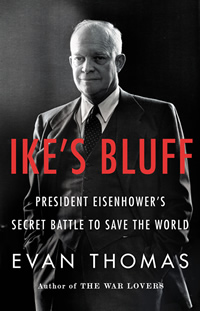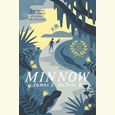Playing for Keeps
In a new book, Evan Thomas praises the gamesmanship of Dwight Eisenhower
According to Evan Thomas, the world owes a huge debt to Dwight Eisenhower’s excellence at playing cards. As Thomas recounts in Ike’s Bluff: President Eisenhower’s Secret Battle to Save the World, the thirty-fourth president was a master at both reading people and playing the odds, abilities that served him well whether at the bridge table or the negotiating table: “Eisenhower, who generally radiated warm sincerity and whose emotions were easy to read, was actually a great bluffer, and not just at cards.” Thomas argues that Ike bluffed his way through eight years of confrontation with the Russians and Chinese, preventing a war that he believed would leave civilization a smoldering heap.
Thomas, a former editor-at-large of Newsweek and author of seven other histories has, in his last two works, focused on issues of war and peace. In The War Lovers, he examined the nation’s march into the Spanish-American War. That provocatively titled book presented Theodore Roosevelt as eager to prove himself and his country in battle, regardless of the human cost. In the new book, Thomas takes a different tack, advancing the image of Ike as an underappreciated warrior-cum-peacemaker. Other historians have made this point as well, and Ike’s Bluff draws on their work, combines it with Thomas’s original research into the men and women who knew Eisenhower personally, and presents the argument in a page-turner of a book that deserves wide circulation.
 That Eisenhower was instrumental in winning World War II is generally unquestioned. But for most of the past fifty years, his performance as president has been regarded as substandard. Genial. Non-intellectual. Detached. These are among the kinder words applied to Ike’s managing of America’s affairs during the 1950s. This image was promulgated by his enemies, notably supporters of the Kennedys, who needed to contrast their candidate’s youth—and inexperience—with the apparent senility of the old war horse. “The hatchet job” Thomas notes, “was one of the most lasting and effective in political history.” But in recent years, historians have reassessed Eisenhower, with many now placing him among the top ten presidents. In part, this rehabilitation is due to the discovery that the man who often mangled the English language in press conferences and who once publicly called himself a “dumb bunny” was in fact a shrewd customer, a brilliant tactician, and a master puppeteer who pulled strings from off stage.
That Eisenhower was instrumental in winning World War II is generally unquestioned. But for most of the past fifty years, his performance as president has been regarded as substandard. Genial. Non-intellectual. Detached. These are among the kinder words applied to Ike’s managing of America’s affairs during the 1950s. This image was promulgated by his enemies, notably supporters of the Kennedys, who needed to contrast their candidate’s youth—and inexperience—with the apparent senility of the old war horse. “The hatchet job” Thomas notes, “was one of the most lasting and effective in political history.” But in recent years, historians have reassessed Eisenhower, with many now placing him among the top ten presidents. In part, this rehabilitation is due to the discovery that the man who often mangled the English language in press conferences and who once publicly called himself a “dumb bunny” was in fact a shrewd customer, a brilliant tactician, and a master puppeteer who pulled strings from off stage.
In Ike’s Bluff, Thomas recounts many examples of Eisenhower’s competence, focusing almost entirely on the stormy foreign affairs of the early years of the Cold War. In those days of menace, Eisenhower put to good use his vast military knowledge and intense desire to avoid another world war. He didn’t exactly fear war, but knew that the world couldn’t afford what would happen if one started. The reason, of course, was nuclear weapons. “Eisenhower was the first man in history to make real the mythical power of a god,” Thomas writes. The ability to destroy the world weighed heavily on the president, and his health suffered as a result. But he couldn’t share the burden with anyone else, lest he reveal his cards, and as a card player Ike knew he had to keep them close to his chest. It is a testimony to the enforced loneliness of such power that to this day no one, not even his son John, can say for certain whether Eisenhower would have used nuclear weapons if a war—even a small one—had started. This was, in Thomas’s telling, the great bluff. By never committing for or against nukes, Eisenhower kept his opponents off balance.
 But it was more than mere bluff. Eisenhower didn’t need to fake it because he had gambled and won the trump cards. The U-2 spy-plane program, which he authorized, had revealed that Soviet nuclear capability was being oversold by both the Kremlin and the Pentagon. Khrushchev could bluster and brag all he wanted, but Ike knew the Soviets couldn’t back up their threats militarily. American generals and politicians could cry for larger defense budgets, but no more tools of war were needed. There was no bomber gap. There was no missile gap. But it was a secret Eisenhower couldn’t reveal, Thomas writes, because “he did not want to force a public confrontation.” Going public with the U-2 program might cause the Soviets to lash out and start the conflict he hoped to avoid. It is ironic, however, that the secret program which gave Eisenhower the confidence to resist war ultimately nearly caused one: when a U-2 was shot down in 1960, his hopes for détente with the Soviet Union died. Events were set in motion that, in the Kennedy years, took the world to the brink of annihilation in the Cuban Missile Crisis.
But it was more than mere bluff. Eisenhower didn’t need to fake it because he had gambled and won the trump cards. The U-2 spy-plane program, which he authorized, had revealed that Soviet nuclear capability was being oversold by both the Kremlin and the Pentagon. Khrushchev could bluster and brag all he wanted, but Ike knew the Soviets couldn’t back up their threats militarily. American generals and politicians could cry for larger defense budgets, but no more tools of war were needed. There was no bomber gap. There was no missile gap. But it was a secret Eisenhower couldn’t reveal, Thomas writes, because “he did not want to force a public confrontation.” Going public with the U-2 program might cause the Soviets to lash out and start the conflict he hoped to avoid. It is ironic, however, that the secret program which gave Eisenhower the confidence to resist war ultimately nearly caused one: when a U-2 was shot down in 1960, his hopes for détente with the Soviet Union died. Events were set in motion that, in the Kennedy years, took the world to the brink of annihilation in the Cuban Missile Crisis.
Ike’s Bluff opens with Eisenhower’s farewell address, in which he famously warned America of the dangers of the military-industrial complex. It was a heartfelt speech by an old warrior who feared the next generation wouldn’t be strong enough to resist the temptation of small wars that he believed would certainly lead to the next, and presumably last, big war. He was correct about the military-industrial complex, but the fact that the world resumed fighting small wars even in the presence of ridiculously large nuclear arsenals was in part a repudiation of the theory of inevitable escalation that had guided his administration’s foreign policy. A new paradigm, known as mutual assured destruction, replaced it, allowing the powers-that-be to pursue their age-old rivalries in the hope that no one would be stupid enough to use the bomb. But in those first few years of nuclear anxiety, when people around the world went to sleep not knowing whether they would wake to a mushroom-shaped dawn, there was a man in the White House dedicated to and, more importantly, capable of preventing the nightmare scenario. He was a friendly-looking grandfather named Ike, and he was a hell of a card player.
Evan Thomas will appear with Jon Meacham to discuss Ike’s Bluff at Montgomery Bell Academy in Nashville on February 28, as part of the Salon@615 series. The event is free and open to the public.


